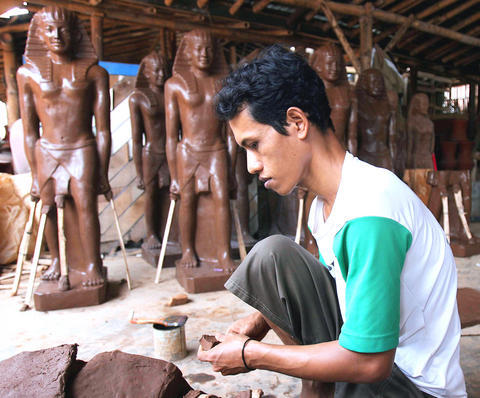Pottery maker Ariyati looks over the clay jars, vases and animals crammed into her small workshop in central Indonesia and fears for her future.
Since last year's devastating earthquake, she has been diligently trying to ply her trade in tiny Kasongan village whose artisans have a proud history of fine ceramic and terracotta goods.
But her brick oven was smashed in the 6.3-magnitude quake, which laid waste to villages on the main island of Java, leaving the 47-year-old mother unable to finish her handicrafts and meet the demands of her customers.

PHOTO: AFP
"Earthenwares which are not dried in an oven can only be sold at a very low price," said Ariyati, whose husband died several months ago.
"It's difficult to rebuild my business," she added.
In the 12 months since the quake, the UN and other agencies have revived small traditional industries such as pottery, weaving and furniture production for more than 4,000 households in the worst-effected areas.
But the scale of the tragedy, with 5,778 people killed and almost 140,000 homes destroyed on the main island of Java, has meant assistance has not reached all of those affected.
About 95 percent of enterprises in the worst-hit regions of Bantul south of Yogyakarta and Klaten to the northeast were partially or completely destroyed, according to this week's World Bank report into the tragedy.
Between 45 to 50 percent of small businesses are not fully repaired 12 months later, and funding from governments and agencies to help all of them recover has fallen short, the bank says.
Many of the business owners who have resumed operations have gone into debt to meet costs -- such as reconstruction of buildings and replacement of ruined materials and equipment.
"Key funding gaps remain to compensate for losses to the private sector and in health and education. More than half the affected businesses have still not recovered to their full pre-earthquake sales levels and unemployment has risen substantially," the report says.
In another workshop in Kasongan, Painem sits on a low wooden seat carefully moulding a pot. She too is worried about her future after borrowing 20 million rupiah from a bank to rebuild her workshop that was shattered in the quake.
"It's a lot of money and I'm living on credit with a high rate of interest," she said, adding that she handed over her land ownership certificate as a guarantee for the loan.
"I used the money to build a brick oven and to buy materials," she added.
Others are more optimistic that, despite their losses, they can recover. Gondo Sunarno, 65, and many others in Mlese village in Klaten have been given funds from a World Bank-managed fund to rebuild their homes.
Sunarno says with that financial burden lifted, he can concentrate on rebuilding his business of making and selling a local variety of rice snacks called krupuk karak, a venture he shared with his wife before she was killed in the quake.
"I'm sure my wife will love the idea," he said.

Nvidia Corp chief executive officer Jensen Huang (黃仁勳) on Monday introduced the company’s latest supercomputer platform, featuring six new chips made by Taiwan Semiconductor Manufacturing Co (TSMC, 台積電), saying that it is now “in full production.” “If Vera Rubin is going to be in time for this year, it must be in production by now, and so, today I can tell you that Vera Rubin is in full production,” Huang said during his keynote speech at CES in Las Vegas. The rollout of six concurrent chips for Vera Rubin — the company’s next-generation artificial intelligence (AI) computing platform — marks a strategic

Enhanced tax credits that have helped reduce the cost of health insurance for the vast majority of US Affordable Care Act enrollees expired on Jan.1, cementing higher health costs for millions of Americans at the start of the new year. Democrats forced a 43-day US government shutdown over the issue. Moderate Republicans called for a solution to save their political aspirations this year. US President Donald Trump floated a way out, only to back off after conservative backlash. In the end, no one’s efforts were enough to save the subsidies before their expiration date. A US House of Representatives vote

REVENUE PERFORMANCE: Cloud and network products, and electronic components saw strong increases, while smart consumer electronics and computing products fell Hon Hai Precision Industry Co (鴻海精密) yesterday posted 26.51 percent quarterly growth in revenue for last quarter to NT$2.6 trillion (US$82.44 billion), the strongest on record for the period and above expectations, but the company forecast a slight revenue dip this quarter due to seasonal factors. On an annual basis, revenue last quarter grew 22.07 percent, the company said. Analysts on average estimated about NT$2.4 trillion increase. Hon Hai, which assembles servers for Nvidia Corp and iPhones for Apple Inc, is expanding its capacity in the US, adding artificial intelligence (AI) server production in Wisconsin and Texas, where it operates established campuses. This

US President Donald Trump on Friday blocked US photonics firm HieFo Corp’s US$3 million acquisition of assets in New Jersey-based aerospace and defense specialist Emcore Corp, citing national security and China-related concerns. In an order released by the White House, Trump said HieFo was “controlled by a citizen of the People’s Republic of China” and that its 2024 acquisition of Emcore’s businesses led the US president to believe that it might “take action that threatens to impair the national security of the United States.” The order did not name the person or detail Trump’s concerns. “The Transaction is hereby prohibited,”